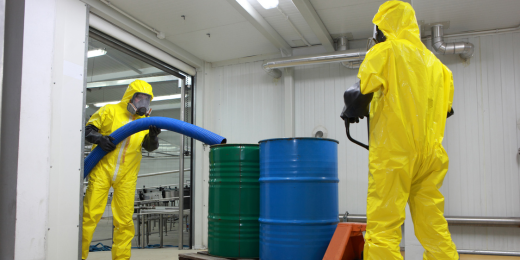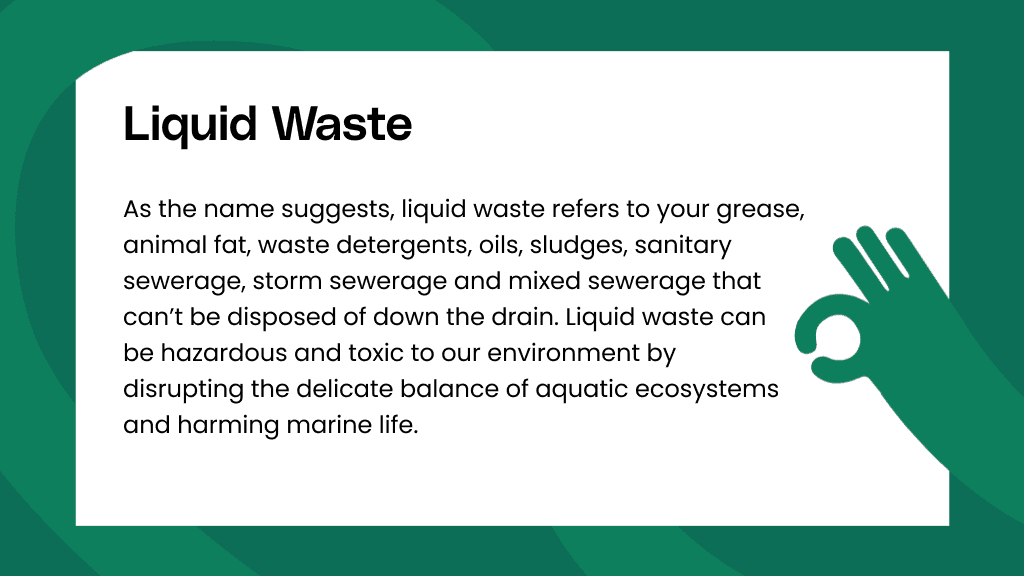Reclaim Waste for Beginners
Reclaim Waste for Beginners
Blog Article
5 Easy Facts About Reclaim Waste Shown
Table of ContentsThe Greatest Guide To Reclaim WasteExcitement About Reclaim WasteReclaim Waste for DummiesGetting My Reclaim Waste To WorkA Biased View of Reclaim WasteThe Basic Principles Of Reclaim Waste

Never place hazardous materials down sinks, toilets or stormwater drains Materials consisting of petroleum, grease, oil, pesticides and herbicides, and solvents such as paint pole dancers should not be poured down sinks, commodes or stormwater drains. These compounds are tough to remove in the sewage therapy process and create pollution problems in our neighborhood rivers.

Liquid waste is a term that covers a wide selection of products, there's a good reason why leaving its disposal to the experts is suggested. Fluid waste is non-solid product that has no more use and should be treated and dealt with according to regional, state and government laws.
Some Known Incorrect Statements About Reclaim Waste
Although instances of fluid waste can consist of wastewater, fats, oils or oil, made use of oil, fluids, solids, gases or sludges and dangerous home liquids, there are some that are considered to be more unsafe than others when it involves the setting and the health and wellness of animals and humans alike. It's for this factor that each state and area have strict regulations connected to liquid waste management.
Fluid waste can be saved in holding storage tanks or packaged in drums, intermediate bulk containers or approved small containers prior to either being dealt with or removed via outsourced vacuum cleaner trucks. Given the nature of the products, fluid waste can not go in the general waste stream and there are strict laws on exactly how to deal with it correctly.
(https://writeablog.net/reclaimwaste1/reclaiming-resources-a-comprehensive-guide-to-industrial-wastewater-treatment)Relying on a resolution of the level of risk, it might be required to remediate those websites. On top of that, unsafe liquid chemical wastes are regulated waste and needs to be tracked in accordance with the state waste regulation. Under the chain of custody and responsibilities, proprietors are responsible and accountable for waste generated by an organization.
One of the core applications for superabsorbent polymers (SAPs) is fluid waste solidification. industrial wastewater treatment. SAPs are used by waste management experts to avoid potentially harmful fluids from getting in waterways, groundwater aquifers, and other delicate environments. Since fluids can swiftly carry impurities into environmental receptors and possibly add to geotechnical failures, liquid wastes are often prohibited from disposal in garbage dumps
Some Known Details About Reclaim Waste
Essentially, complimentary liquids are liquids that separate from the solid portion of waste material. Liquid waste can include the following: HDD mud and cuttings Landfill leachate Wastewater treatment sludge & biosolids Dredged sediments Oil and gas drill cuttings Resolving fish pond muck Hydro Excavation slurry Coal combustion residuals/ash Container base sludge Concrete grinding/polishing slurry Relevant Write-up: For a sensible instance of cost-free fluids separating from waste material, consider the following circumstance: A waste monitoring service provider lots a dump vehicle with sludge from a wastewater treatment plant's aeration container, throughout a routine maintenance occasion.
When the vehicle driver arrives at the landfill, he notifications water seeping from the sludge and pouring from the dump vehicle. The tons was declined by the landfill and the vehicle driver was compelled to dispose of the waste as a fluid waste at a special center, which boosted the disposal charges tremendously.
We likewise require to be accountable for the correct disposal of our waste materials. It is not enough that we pay waste disposal business to take treatment of our rubbish.
The Main Principles Of Reclaim Waste

Segregating your waste can start inside the home. Segregate dry and fluid waste as well as edible waste, biodegradable and non-biodegradable materials.
You can utilize old trash can, bucket, garden pot or old plastic drums. Drill 4 to 5 openings in the container so the air can circulate. Layer all-time low with soil to take in the damp waste. Beginning the composting procedure. Layer the compost with wet and dry waste in addition to dirt to keep an equilibrium in between the damp and the dry.
The Ultimate Guide To Reclaim Waste
Cover the garden weblink compost bin. When a week, add soil in addition to the garden compost. To assist in faster decay, you can also add semi composted dirt to the garden compost. Maintain the compost. If you see the scent is ending up being too strong, include additional newspapers and paper waste or include even more holes to the garden compost bin to keep the equilibrium of the waste materials.
We likewise require to be accountable for the correct disposal of our waste materials. It is not enough that we pay waste disposal firms to take care of our rubbish.
Our waste, our obligation. Have you ever before wondered what occurs to your liquid waste after it's gathered? Did you recognize that liquid waste can be reused? As responsible people, you ought to recognize what happens to your rubbish and where it pursues it is eliminated from you. Comprehending the fluid waste removal procedure is essential in aiding you to segregate your waste.
The Buzz on Reclaim Waste
Segregating your waste can begin inside the home. Segregate dry and liquid waste as well as edible waste, biodegradable and non-biodegradable materials.
You can utilize old trash bin, container, garden pot or old plastic drums. Drill four to five holes in the container so the air can circulate. Layer all-time low with dirt to soak up the damp waste. Begin the composting procedure. Layer the compost with wet and completely dry waste as well as dirt to preserve a balance in between the wet and the dry.
Cover the compost container. When a week, add soil in addition to the garden compost. To assist in faster decay, you can also add semi composted dirt to the garden compost. Maintain the garden compost. If you observe the odor is becoming also strong, add extra papers and paper waste or add more openings to the compost container to maintain the balance of the waste materials.
Report this page